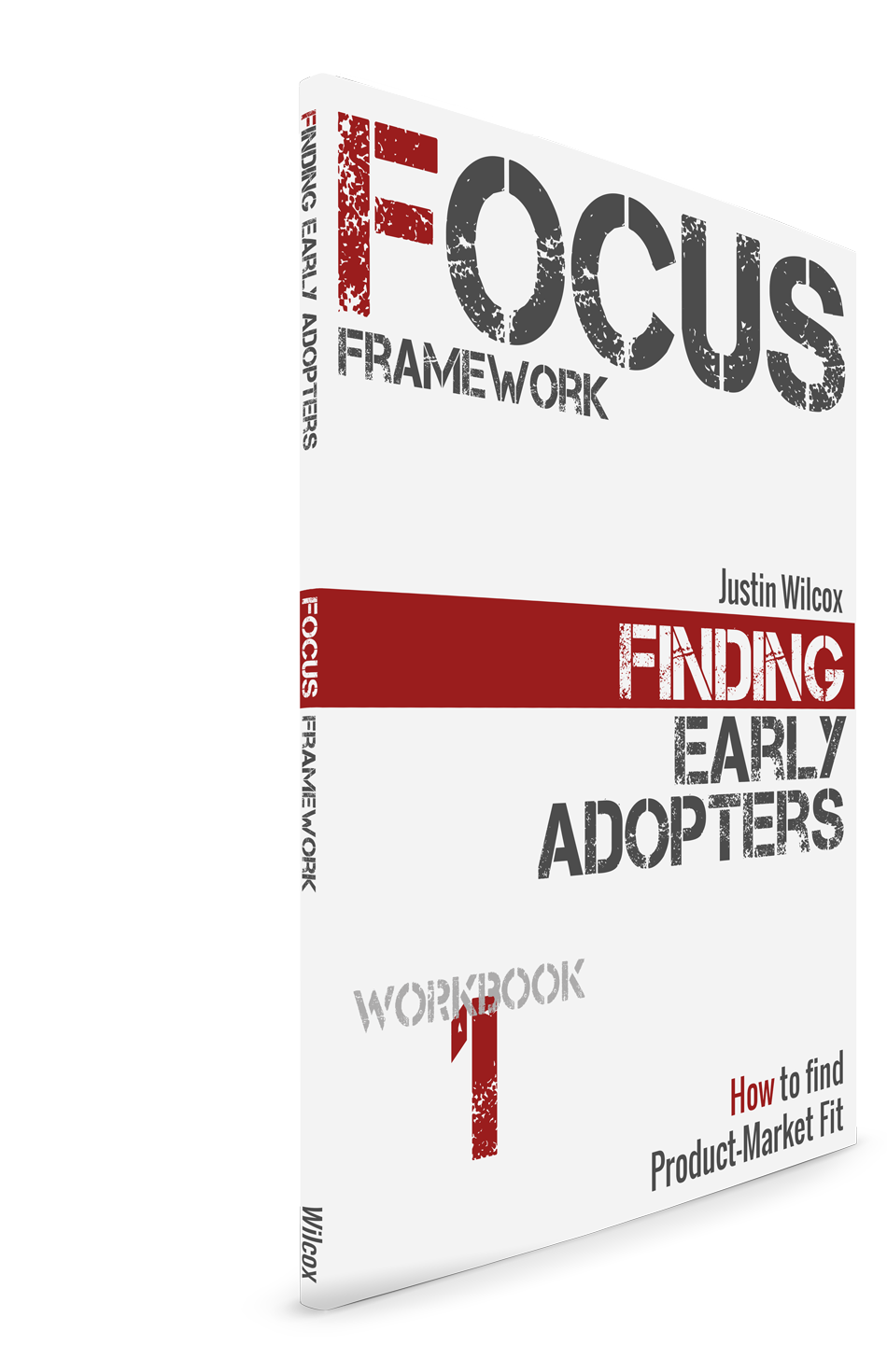





Calm the Overwhelm
Validation Made Simple
5
workbooks
501
pages
44
exercises
12
hours of video
1 Path
to Product-Market Fit
Start Finding your Product-Market Fit
Learn How to take your Next Step
Every exercise has a step-by-step video.
42 Videos
12+ Hours
Workshop Content
Same exercises I teach at accelerators
$5,400 Value
5 days worth of workshops
Founders Love FOCUS
"Hand's down the best resource I've seen on Lean Startup."
Mark Horoszowski, Lean Startup Conference Speaker
Take Action. Not Courses.
FOCUS isn't a book series, it's a workbook series.

Declaring Victory
Your #1 priority as a founder, is to find Product-Market Fit.
To Find it, You Must Define it
Founding teams struggle to find Product-Market Fit, in large part, because they don't define it. In this exercise, you'll solve that problem.Marc Andreessen coined Product-Market Fit as:
"Being in a good market with a product that can satisfy that market."That's a helpful start, but what constitutes a "good" market? And how do you measure if you've "satisfied" it?
It turns out while Andreessen defined the term, you get to decide what it means.
Product-Market Fit Isn't One Size Fits All
You are the one starting the company, so you get to decide what a "good market" is.For one founder, satisfying a good market may require building a $10 billion business. For another, it may mean creating a company she can run while travelling six months a year. For another it may mean lifting tens-of-thousands of people out of poverty.
Your company is a vehicle to achieve your goals.To satisfy a good market simply means you've built a company that enables you to achieve what you set out to. Of course to achieve those goals, you have to know what they are.
The process of defining your personal success criteria is called, Declaring Victory.
Once you Declare Victory...
1. Every Decision will be Easier to Make
This can be a stressful time in your journey. Ahead of you lie hundreds of difficult decisions, none of which have obvious answers:- Which customers should you target first?
- What features should your product have?
- How much should you charge?
- Should you raise money?
- What skills should your co-founder(s) have?
- And on, and on, and on...
2. It will give you the Confidence to Pivot
It's in our nature to get emotionally attached to our ideas, our products and our customers. That attachment will serve you well, once you've found a sustainable business model. At the same time...Emotional attachment kills companies.It doesn't serve you well while you're searching for a sustainable business model.
During this search phase, you need to:
- See the world as it actually is
- Interpret data without bias and
- Listen to your customers, without leading them.
3. Unify your Founding Team
The most powerful thing you can do when building your startup team, is align the founders' goals.Misaligned goals will lead to disagreements during every critical phase of your business development:
- What's your revenue model?
- What qualities do you want in the people you hire?
- Can people work remotely?
- What happens when we run low on money?
- And on, and on, and on...
On the other hand, aligned goals will make seemingly difficult discussions easy, enable your leadership team to support one another during difficult times, and make it more likely you'll all achieve what you're looking for.
How do you Declare Victory?
Write in the product or service that you would like to build.
Click for an Example
As you move through FOCUS's exercises, I'll illustrate each step using my own experiments and experiences.
- Even if you never get to build your product and
- Even if you are not able to help the people you want to help...
You are still going to achieve victory.
Yet you're still going to achieve victory.In Step 2, you stated that this product will serve a specific type of customer; however the customers who truly want, and are in a position to pay for, your help are probably different than the ones you're imaging now.
Yet you're still going to be victorious.In this exercise, you're making a promise to yourself that even if you have to pivot your product, and even if you have to shift your customer segment, you are committed to your personal fulfillment. What does Victory look like to you?
- Is it dollars in the bank?
- Number of people helped?
- Time with your family?
- Fewer hours at the office?
- People proven wrong?
Please, be selfish.Company vision statements like:
- “Creating a third place between work and home†– Starbucks
- “Accelerate the advent of sustainable transport†- Tesla
This isn't about the change you want to affect in the world, because the time may not be right for that change. You may have no control over if/when that change comes. To emotionally attach to it now is to blind yourself to change that can be affected.
Your victory, is about you.
- How do you want your life to be different?
- What achievements do you want to accomplish?
- How do you want to feel about yourself?
Whatever you decide your victory is, make sure it's measurable by filling in the “number†blank. That'll make it infinitely easier to guide your entrepreneurial ship in that direction.
In my example, what I was looking for most was financial security. So, no matter what I build or who I am able to help, this is my victory.
Here are some other examples:
- 100 employees hired
- $5 billion IPO
- $0 student debt
- 10,000 customers served
- 1 acquisition by Google or Facebook
- < 20 hours/week spent working
- 8 hours of sleep/night
- 12 hours/weekend spent with my kids
- 5 teammates I love spending time with
It's OK to have more than one victory declarationThe more measurable, personal success criteria you have, the better! For example, if victory requires that you achieve three metrics:
- 90% of mornings, I'm excited to go to work
- $500k/year salary for each co-founder
- 5 teammates I love spending time with outside of work
Just make sure every victory criteria is measurable, and isn't dependent on what you want to build, or who you want to build it for.
Write in your measurable Victory metric.
While it may be a bit challenging to come up with, your Victory must be measurable. If it's not, you won't be able to tell if you're on track to get it.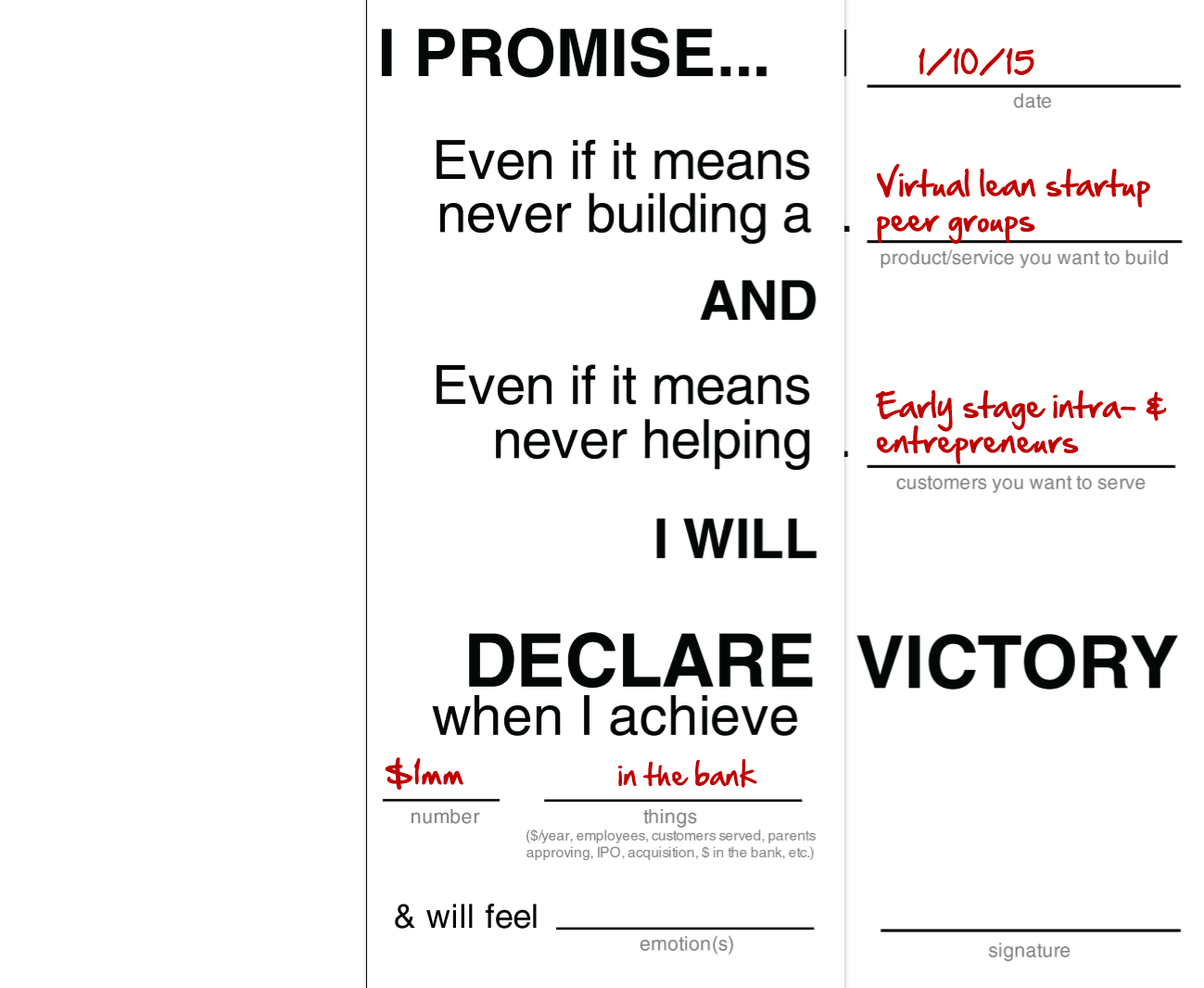
What emotions come to mind when you imagine what will be different in your life when you declare victory?
Why emotions?
Remember that misplaced emotional attachment kills companies. Instead of emotionally attaching to a specific product, you're going to focus your energy where it's most efficient: achieving the emotion that is driving your entrepreneurial journey.
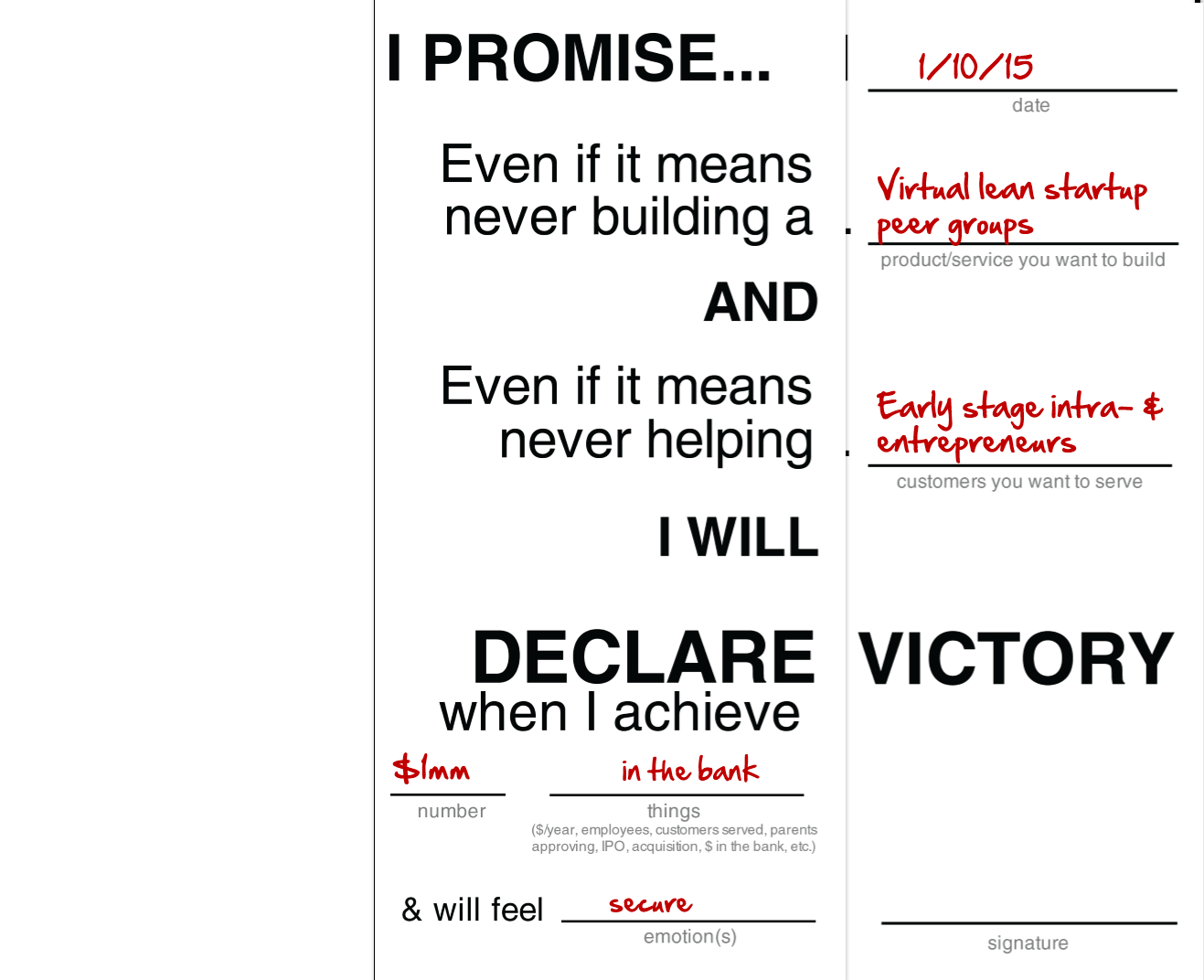
(Wanna know a secret? The reason you're starting a company isn't to achieve your victory. You're starting a company to achieve the emotion you think the victory will give you.)
Congratulations! You have your victory.
Now you know exactly what Andreessen meant when he said, "Being in a good market with a product that can satisfy that market."
You will have found Product-Market Fit, when you satisfy a "good market" that enables you to achieve your victory! Sign your name and post this paper in a very visible place (e.g. your desk, your night stand, your bathroom mirror, your car, etc.).(Posting it will be easier when you're using an actual FOCUS worksheet :)
This paper will remind you of your true aim - even if you have to kill your idea, even if you have to pivot your customer segment, you will still be moving towards your victory by focusing on your personal outcomes.
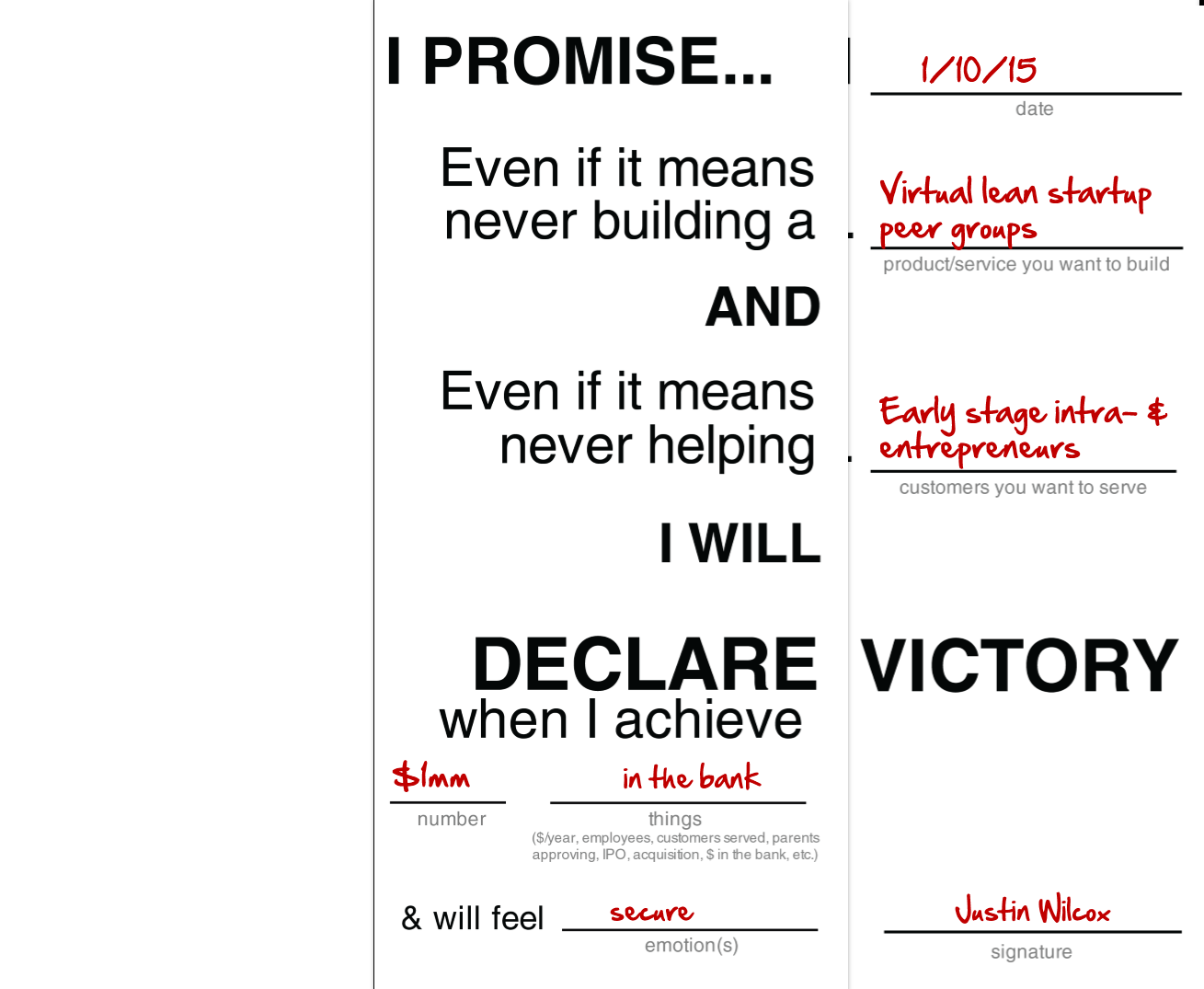
It can be awkward to sit down with your co-founder(s) to understand why they want to start a company - what "victory" looks like for them. At the same time, it's the most important conversation you will have with them.
Misaligned goals is the #1 reason founding teams break up.This exercise makes this crucial conversation with your co-founders easy. Simply have each co-founder fill out the worksheet individually (Steps 1 - 6) and then...
Merge your Victories
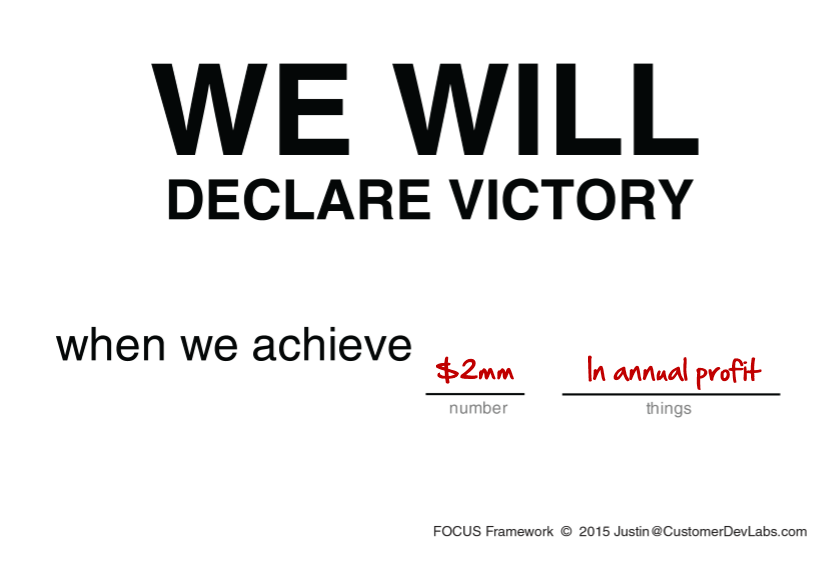 On the back side of the worksheet is a place for your team to merge your declarations into a single, unifying victory.
On the back side of the worksheet is a place for your team to merge your declarations into a single, unifying victory.By merging your goals into a team-wide victory declaration, you can ensure everyone is on the same page and have a common reference point you all turn to when making decisions.
If you're not able to align your goals, better to discover that now than later. So often one founder wants to change the world, while another simply wants personal financial freedom - both are great, but not in the same founding team.
The sooner you find out what you and your co-founder(s) want, the more quickly you can get it...either together, or apart.
I said declaring your victory would:
- Make decisions easier
- Give you the confidence to pivot and
- Unify your founding team
Declaring Victory - your personal victory - makes decisions easier by reminding you what's most important about this journey.
Declaring Victory gives you the confidence to pivot because focusing on your personal goal allows you to respond effectively to real-world data - even when that data is different than what you wanted it to be.
Finally, Declaring Victory facilitates the critical "Why are we all doing this?" conversation between you and your co-founders. The results of this conversation will strengthen your team to withstand the emotional roller coaster that is starting a company.
Congratulations, you've taken the most important step of your startup journey, you've Declared Victory and in doing so, defined your Product-Market Fit.
Now it's time, to go get it!If you want a copy of this worksheet, and help achieving your Product-Market Fit, get your copy of FOCUS today!
How do you Learn Best?
Video, print and electronic versions available.
Workbooks
How do you Learn Best?
Print and electronic versions available.
Workbooks
Table of Contents
Every step you need to find Product-Market Fit.
Workbook 1: Finding Early Adopters
- Declaring Victory1
- Idea Generation9
- Customer Storming and Role-izing14
- Who are your Early Adopters19
- SCALE your Segments28
- 50 ways to talk to 5 People35
- Interview Channel Costing45
- How to Ask for Interview51
- What to Ask59
- Interviewing Like a Pro69
- 5 Interview Checkpoint78
- You've Found your Early Adopters When...85
Workbook 3: Currency Testing
- What is Currency Testing1
- Currency Ladder6
- Currency Calculator18
- Currency Experiment Design27
- Increasing your Conversion Rate with A/B Testing35
- Increasing your Conversion Rate with Solution...43
- How to Pre-Sell Anything54
- Science of Pricing62
- How to Test your Price70
- You've Validated your Currency When...78
Frequently Asked Questions
If you order the electronic versions, you'll get access to the complete FOCUS Framework immediately.
If you order the printed version of FOCUS, US orders will arrive within 1 week and international orders should arrive within 1 - 4 weeks.
The electronic version of FOCUS comes in two variations:
- An online version that includes live updates to the workbooks, plus the ability to ask questions about specific exercises and get answer from me and other members of the FOCUS community.
- A PDF version you can read offline, whenever/wherever you are.
When you purchase FOCUS, you'll get both variations.
If you decide the FOCUS Framework isn't the most practical guide to finding Product-Market Fit available, simply email us within 14-days of your purchase, and we'll give you a full refund minus any shipping fees.
Still have questions?
Get In TouchDo you Teach Entrepreneurship?
We've built a special curriculum version of FOCUS to help professors teach students:
- Idea generation
- Problem validation
- Customer interviewing
Read more about the
Experiential Entrepreneurship Curriculum
The Team

Harshit Sekhon
Product strategist / project manager nurturing PlanMyMeal.co, motorcycle rider, aspiring bodybuilder.

Will Smith
Founder with a passion for all things early stage, particularly finding product-market fit and making that first sale.

Kevin Miller
Growth marketer with an expertise in paid acquisition, SEO & Email Marketing
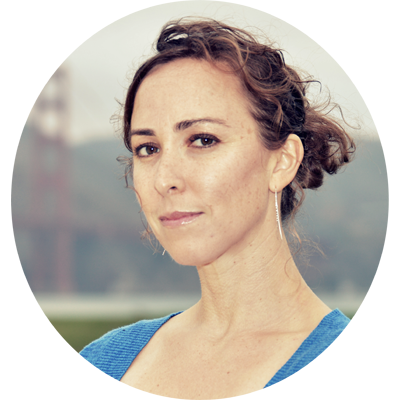
Liz Angoff, PhD
Educational Psychologist and Editor

Justin Wilcox
Author, Advisor and Founder of Customer Development Labs
